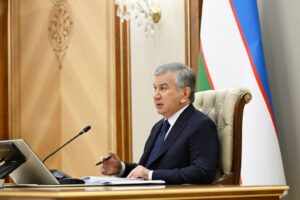Uzbekistan Advances Nuclear Energy Development as Part of Long-Term Energy Strategy

Tashkent, The Gulf Observer: President Shavkat Mirziyoyev was briefed on the progress of nuclear energy initiatives as part of Uzbekistan’s broader strategy to meet rising electricity demand and enhance energy security.
Over the past five years, Uzbekistan has achieved a 30% increase in electricity generation, reaching 81.5 billion kilowatt-hours. The expansion of renewable energy sources has been a priority, with green energy now accounting for 16% of the total electricity mix. In 2023 alone, 3.2 gigawatts of additional capacity were introduced.
To address future energy challenges, strategic planning and diversification remain key. According to projections, Uzbekistan’s electricity consumption is expected to reach 121 billion kilowatt-hours by 2035. In response, the government aims to increase the share of renewable energy to over 50% by 2030, while simultaneously integrating nuclear energy as a cornerstone of its long-term energy policy.
A small modular reactor (SMR) project is currently in development, with working groups engaged in feasibility studies and a roadmap under preparation. Additionally, a Joint Action Plan (2025-2027) has been established in collaboration with the International Atomic Energy Agency (IAEA). The entire nuclear power plant construction process—from design to completion—will be closely supervised by the IAEA, ensuring adherence to global safety standards.
During the meeting, officials provided updates on negotiations with international partners, permitting procedures, financing sources, and technical aspects related to the placement and construction of a large-scale nuclear power plant. These efforts reinforce Uzbekistan’s commitment to sustainable energy development and economic resilience in the face of growing electricity demand.


